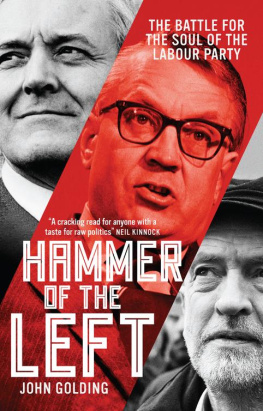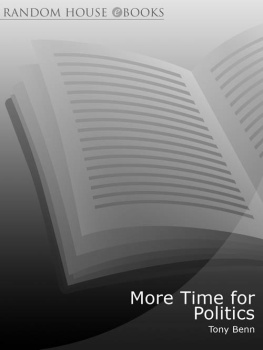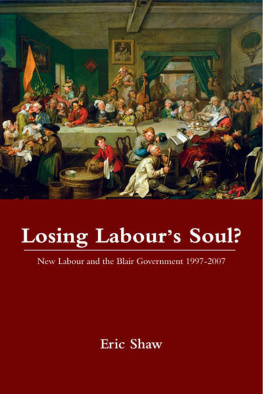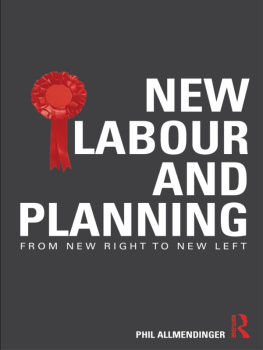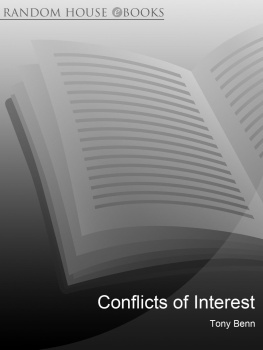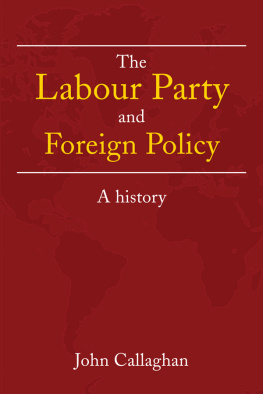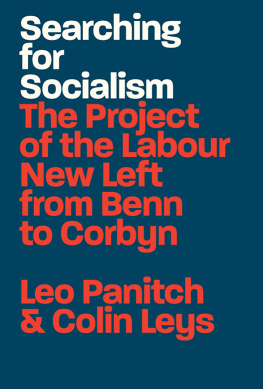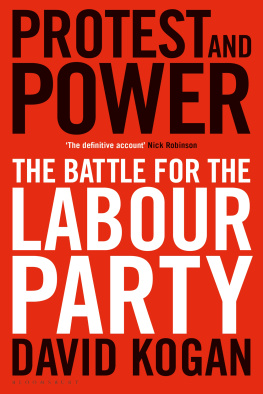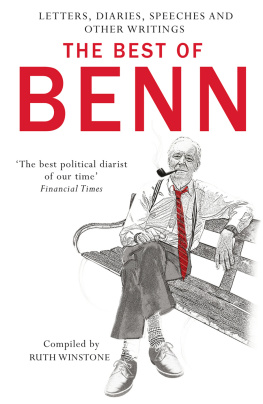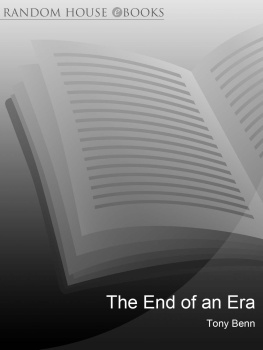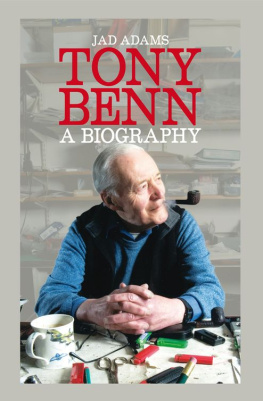F IRSTLY MY THANKS TO Lewis Minkin for his book Contentious Alliance. Had my good trades union brothers not been so upset by his lack of balance, they would not have pressed for this book to be written. My wife Llin also wanted it done for the better reason that she believed strongly that honour was due to Roger Godsiff and John Spellar and our team of union loyalists for saving the Labour Party in the early 1980s.
It is a book I did not want to write, but sadly no book so far has done justice to this fight. Most accounts by experts, indeed, have been written without even talking to us! Many biographies, too, are full of inaccuracies and economy with the truth.
Of course, I have been helped by many people. Without the research by Paul Richards-Mole, it would never have got off the ground and without the restructuring and criticism of Paul Farrelly, it would never have been finished. For help with the computer, my thanks go too to Steve Lewis and for their archives, to the TUC Library and the National Museum of Labour History. Most of this book has been written from the minutes of Labours National Executive Committee (NEC). If the style has suffered as a result, these have at least given me the accuracy (and unfairness!) I have worked hard to bring.
I should also acknowledge the journalists and their newspapers, for use of whose material I am very grateful. I always enjoyed greatly the contributions of The Guardian Labour Party members favourite newspaper in particular Simon Hoggart, Julia Langdon, Keith Harper and Ian Aitken. Mention is also due to Adam Raphael then at The Observer.
I owe a great debt to Tony Bevins, whose integrity and cynical wit I came to appreciate greatly. At The Times, Donald Macintyre, Julian Haviland and Philip Webster were also very sound. And Paul Routledge also made a contribution!
For me always the most important newspaper was the Daily Mirror. The political team headed by Terry Lancaster wrote in a style and tone I enjoyed and they helped me in the fight for moderation in the Labour Party more than most.
My thanks go, too, to the many individuals who have given me the benefit of their memories and, very importantly, to the Benn Diaries, which conducted in the privacy of his own mind - are not always accurate, to say the least.
My thanks most of all go to all those who stood and fought to save the Labour Party.
J OHN G OLDING
W INTER 1998
* * *
M Y THANKS GO TO Iain Dale for suggesting over the summer, with Jeremy Corbyn clearly heading for victory in the leadership race, that we bring out a paperback edition of Hammer of the Left, which had been long out of print.
That copies of the book were changing hands over the internet at ten times the original cover price certainly suggested there might be an appetite!
I want to say thank you again to Neil Kinnock for generously agreeing to update his original, pithy Foreword, to John Spellar and Roger Godsiff for their help the first time round and for comments on the new Postscript, to Sharlene McGee and Neil Watkins in my Westminster office for their research input and to Olivia Beattie and Victoria Godden at Biteback for turning everything around so swiftly and efficiently.
Thanks, too, to The Guardian for its kind permission to include the obituary of John, which I wrote for the newspaper after his untimely death, all too young, in 1999.
As I said in the original hardback edition twelve years ago, the words in this account are John Goldings. Where I have edited, I have done my utmost to stay true to John in style, tone and trademark, mischievous sense of humour.
In the new Postscript, too, I have not only tried to bring the book up to date, but to write in Johns diary style, while losing none of the detail that he would have observed so closely. In doing so, I hope I havent missed anything, made it too hard-going, been unduly unfair or left too many hostages to fortune. Any mistakes, of course, are entirely my own and Johns own words, of course, have not been updated to reflect the passage of time, remaining true to the situation as he saw it when writing.
This book belongs again to the memory of John Golding, everyone who fought with him to save the life of the Labour Party and those already doing battle again to re-capture its soul.
P AUL F ARRELLY MP
S PRING 2016
BY NEIL KINNOCK
J OHN G OLDING WANTED L ABOUR to be elected and re-elected to government as the party of justice, jobs, security and opportunity. Those purposes were and are shared by many. What made him different was his ruthless diligence in organising for them. In Labours years of near self-destruction in the late 1970s and 1980s he was merciless in his treatment of anyone or anything that he considered to be standing in the way of achieving those objectives. His relentless organisation, his plotting to beat plotters, his use of sectarian methods to beat sectarians are without precedent or copy.
This book is a dipped-in-vitriol documentary of those efforts. It tells the story without deference to the Marquis of Queensbury or anyone else, but with gallows humour, pace and fish-hook frankness. Because of that it provides a chronicle for students, a cracking read for anyone with a taste for raw politics, and an object lesson for any political party that allows itself to drift away from electoral reality and into the wilderness of illusion and self-obsession.
N EIL K INNOCK
J ULY 2003
* * *
I N THE TWELVE YEARS since I wrote that Foreword, the Labour Party has won one and lost two general elections in tumultuous times. It experienced at the top sourness and split that, to a greater extent than ever before, arose from animosities between personalities and their retainers rather than policy conflicts. Its unprecedented thirteen years in government, which brought jobs, security and record health, education and anti-poverty spending, ended in the wake of historys greatest economic crash caused by the excesses of international market chicanery. That government was buried in the shroud of incompetence despite the fact that the Prime Minister and Chancellor had managed a gigantic rescue from ruin nationally and secured multi-governmental action that saved global capitalism from devastation. In this century, the party has been deserted by members disillusioned with decisions to wage war in the Middle East and make passive peace with filthy rich financial interests. And then, following defeat in the 2015 general election, a surge in sentiment and eligible voters, enfranchised through revised party rules, resulted in the election to leadership of an MP that had around fifteen committed supporters in a PLP of 232.
That result did not surprise me. It was a reaction waiting to happen. The size of that victory was, of course, facilitated by the changes that vastly expanded the Labour electorate for the price of a pint (or its temperance equivalent). But from the moment that Jeremy Corbyn, more pleasant, calm and appealing than previous contestants from the PLP awkward squad, gained enough MP nominations to put him on the ballot paper, my own experience told me that he was odds-on favourite to win. For years, at frequent party suppers and socials, I had been factually exposing George Osbornes falsehoods about Labours ruinous legacy, his risible Long-Term Economic Plan and his austerity regime of gross inequity and pillaging of community assets. In those meetings, using the arguments developed by respected economists, I also set out the rational case for investment-led durable growth and social solidarity, emphasising the interdependence of economic efficiency and social justice in modern economies. Those efforts, sometimes conversational and sometimes (I confess) tirading, had roused (mainly) Labour-supporting audiences from pervading glumness. Revealingly and worryingly people from diverse social and educational backgrounds, and of all ages, had said to me that they hadnt heard the argument put like that for a long time. Even taking into account kindness to an old warhorse, such comments came so earnestly and so often that they couldnt be attributed to courtesy, sentimentality or even appreciation of political jokes. They were expressions of frustration and a rising desire to hit back with feasible, productive and enthusing alternatives. Labours cool, crafted critique was despite its intelligence and sincerity not articulating the disgust and fury aroused by the damage and injustice being done to communities and individuals by Toryism and by the glib arrogance with which the harm was being inflicted. Labour people were boiling with irritation and they wanted that to be voiced.

